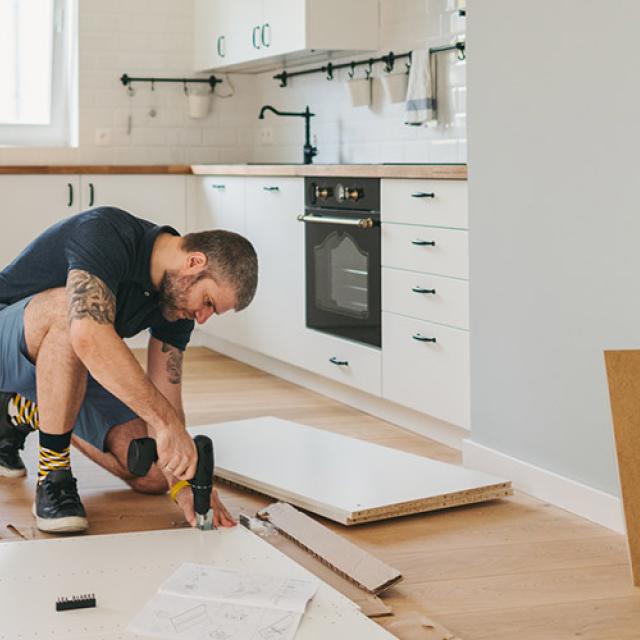Home value: Renovations that pay off

Thinking about home improvements? Not sure where to start? The first step is to think about recouping your investment. Your project should boost the value of your home, for you but also in the eyes of potential buyers. Which renovations offer the biggest bang for your buck and how can you be sure you’ll recoup what you spend? Read on for the answers.
Renovate for the right reasons
Renovations are a big deal. They take a lot of money AND a lot of time. Before you start, it’s important to ask yourself the right questions.
Why do you want to renovate? If a home inspection has uncovered major defects or if the market value is way below the average for similar homes in your neighbourhood, it might pay to renovate. But splurging on costly renovations that make your home worth more than other nearby homes could be a poor financial decision.
What are your short- and medium-term plans? If this is the home of your dreams and you plan to stay put, you can likely justify the cost from all the benefit you’ll enjoy over time. On the other hand, if you’ll only be there for a few years before you sell again or rent your home out, you should opt for renovations with a positive rate of return.
7 renovations that pay off
There are all sorts of surveys and studies on which home improvement projects pay off. They all agree: your best bet is the bathroom or kitchen, year after year. According to the RENOVA study by the Appraisal Institute of Canada (AIC), the return on investment for kitchen and bathroom upgrades varies between 75% and 100% at resale. Learn the seven most profitable projects to consider if you’re looking to boost your home’s resale price.
Bathroom
Bathroom renovations are expensive, so potential buyers will often be put off by a home that needs a bathroom update. When it’s time to sell your house, you want your bathroom to be functional and appealing.
A new bathtub, fresh tiling, a glass shower enclosure, and an updated look are the most cost-effective renovations in this part of the house.
Kitchen
They say the kitchen is the heart of the home. Financially, it’s big part of how much your home is worth. That’s why it should be the first room you tackle. According to an AIC survey, adding an island generates a return on investment of about 65%.
Other small, less expensive improvements can also have a big impact on the look of your kitchen. New cabinets, updated lighting, and a new backsplash are all projects where your dollars will be well spent.
Exterior siding
Curb appeal is a big factor in your home’s resale value. The exterior siding gives people a sneak peek of what they can expect to find behind the front door. If your siding’s worse for the wear, your home won’t be nearly so eye-catching.
Replacing the exterior siding can pay off big! Experts estimate that new vinyl siding can produce a return on investment of about 75%. And remember the finishing touches! Mouldings and a bit of paint can work wonders.
Paint
Another AIC tip: Update your home’s exterior or interior paint and you’ll recoup 50% to 100% of the cost. When you’re picking colours, especially for exterior paint, stick with neutrals and keep in mind that trends come and go.
Energy-saving renovations
Renovations that make your home more energy efficient are likely to produce an excellent return on investment. AIC reports that homeowners will get back more than 60% of what they spend on energy-related improvements. And that’s in addition to savings on their heating and electricity bills. Energy-efficient homes are becoming more and more popular.
High-performance replacement windows and new insulation are reliable investments for energy efficiency.
A new roof
Many buyers are put off by houses that need major roof repairs. If your roof has significant defects, replacing or repairing it will not only prevent leaks and other damage but will also give you a 50% to 80% return on your investment.
Accessories and other details
Small updates can sometimes earn big bucks. Replacing things like closet doors, light fixtures, hinges, and countertops can give your rooms a completely new look without breaking the bank.
Springing for bigger items like a fireplace, a wood deck, or a new wood, aluminum, or steel garage door can be very cost effective, with a return on investment of up to 97%.
On the other hand, certain renovations add very little or no value, or can even be a drawback. One example is swimming pools. Think carefully before embarking on these types of projects.
How to get results that pay
Opting for the most cost-effective renovations doesn’t necessarily mean you’ll get your money back. Plenty of other factors come into play, such as your neighbourhood, the quality of the work, the materials you use, and the general condition of your property. We’ve put together some tips for renovations that will pay off:
- Make a budget and stick to it. Calculate how much you can afford and how long it will take to recoup your investment. Remember to include a contingency fund for unexpected costs.
- Compare your home to others in the neighbourhood. How does it stack up? (number of bedrooms, garage, price in relation to number of rooms, etc.). This will help you estimate your property’s market value once the work has been done.
- Get multiple estimates for your renovations. Before you sign with a contractor or buy materials, shop around! Compare prices and which services are included in each estimate.
- Stick with neutrals. This is especially important if you’re planning to put your home on the market soon. Choose timeless colours and materials that will outlive passing trends.
- Avoid DIY renovations. Think twice before picking up the hammer yourself. You’ll put your property at greater risk of an insurance claim, and shoddy or unsightly work will give you a poor—or zero—return on your money.
Renovations: When to call your insurer
Your home insurance is there to protect the biggest investment you’ll ever make—your home. That’s why it’s important to talk to your insurer whenever there’s a change in your home’s value or risk exposure.
Let your insurer know if:
- Renovations (such as a second storey, an addition, or a finished basement) increase the rebuilding cost for your home.
- Renovations such as a new roof, updated plumbing or a new water heater, a wood-burning appliance, or an extra storey increase or decrease your home’s exposure to risk. You might even see your home insurance premiums go down!
Remember to contact your home insurance representative and tell them about renovations or repairs you’ve done or plan to do. Otherwise, you might not be covered in the event of a claim or you might receive only partial compensation.
Rebuilding cost
Your home insurance policy has a coverage amount that is based on the rebuilding cost of your home and outbuildings—i.e., the amount needed to repair or rebuild your home to what it was before any potential loss. You can make sure you have enough coverage by regularly updating the rebuilding cost with your representative. It some situations, you may need to contact a professional appraiser.
Although the cost of materials has increased during the pandemic, you don’t need to worry if you’re covered for the rebuilding cost as long as you haven’t made any changes to your home since your last insurance update.
Promutuel Insurance covers any additional cost due to increased materials prices for members with Repair or rebuilding without deduction for building depreciation coverage if there haven’t been any changes to their home.



